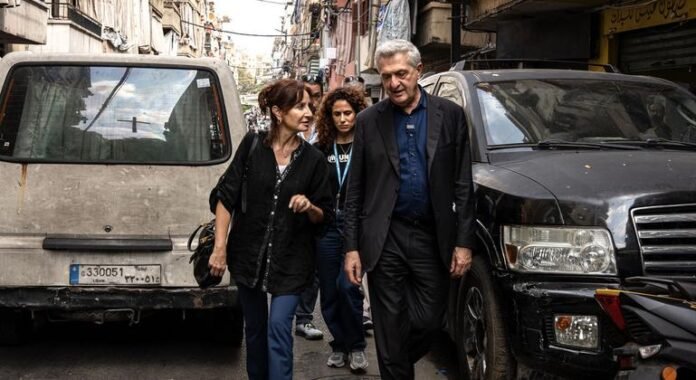Filippo Grandi, head of the United Nations refugee agency – UNHCR, told the organization’s executive committee in Geneva on Monday that the situation of uncertainty and anxiety in Lebanon at this time is more serious than anywhere else.
“There is uncertainty about the lives of ordinary people in Lebanon today,” he said.
“It is certain that if the airstrikes continue, many more people will be displaced and some of them will even consider moving to other countries.”
Filippo Grandi reiterated the need for an immediate ceasefire in Lebanon and the Gaza Strip, saying “a ceasefire that also includes a meaningful peace process may seem difficult.”
“Such a ceasefire is the only way to break this cycle of violence, hatred and impunity.”
He stressed that the ceasefire would not only allow displaced people to return to their homes, but also prevent the conflict from turning into a regional war.
UNIFIL is fully prepared
Meanwhile, the urgent need for a diplomatic solution to the war in Lebanon, where the United Nations Interim Peacekeeping Force (UNIFIL) is deployed in the southern part of the country, has also been stressed.
UNIFIL stands ready to implement the mandate given under Security Council Resolution 1701.
Last week, Israeli forces attacked UNIFIL peacekeepers, prompting UN chief Antonio Guterres to express deep concern and call for UN peacekeepers to be guaranteed protection.
Five UN peacekeepers were injured in these attacks.
In recent days, Israeli troops have forcibly entered UN peacekeeping posts and damaged the posts as well.
All of this is happening amid rapidly rising tensions in the region, with Hezbollah also firing rockets into Israel and Israeli forces carrying out more deadly attacks in Lebanon.
“Our presence there is essential, we need a neutral force in southern Lebanon that can still report to the Security Council,” UNFIL spokeswoman Andrea Tenenti said in an interview with UN News on Monday.
The UNIFIL mission, established by the Security Council, was tasked with monitoring a ceasefire following the 2006 war between Israel and Hezbollah.
This includes ensuring the withdrawal of Israeli forces from southern Lebanon and helping to restore the Lebanese government’s authority in the area.
However, the mission has been unable to provide any assistance to local communities, and frequent shelling and bombing have limited the mission’s monitoring capabilities, UNIFIL spokeswoman Andrea Tenenti said.
“It is therefore important to maintain an international presence there and keep the UN flag flying,” he said.
More than 1.2 million people have been displaced
Meanwhile, the humanitarian situation continues to worsen across Lebanon, with more than 1.2 million people displaced, according to UNHCR.
The UN refugee agency has stepped up its aid efforts to help the people.
The organization wrote on social media, “The streets of Beirut are full of people fighting for asylum. “Human demand is increasing rapidly.”
In addition, thousands of Lebanese people, including many women and children, have fled to Syria under extremely difficult conditions.
On the other hand, UNICEF said that the escalation of war has had a negative impact on children. About one-third of the homeless people in Lebanon are children.
“We are working to prevent violations of international humanitarian law in the country and ensure the protection of civilians as well as civilian infrastructure,” said UNICEF Deputy Executive Director Tad Chaiban, calling for an immediate ceasefire from a school converted into a shelter in Jahle, east Lebanon.
“This madness has to stop,” he said.

